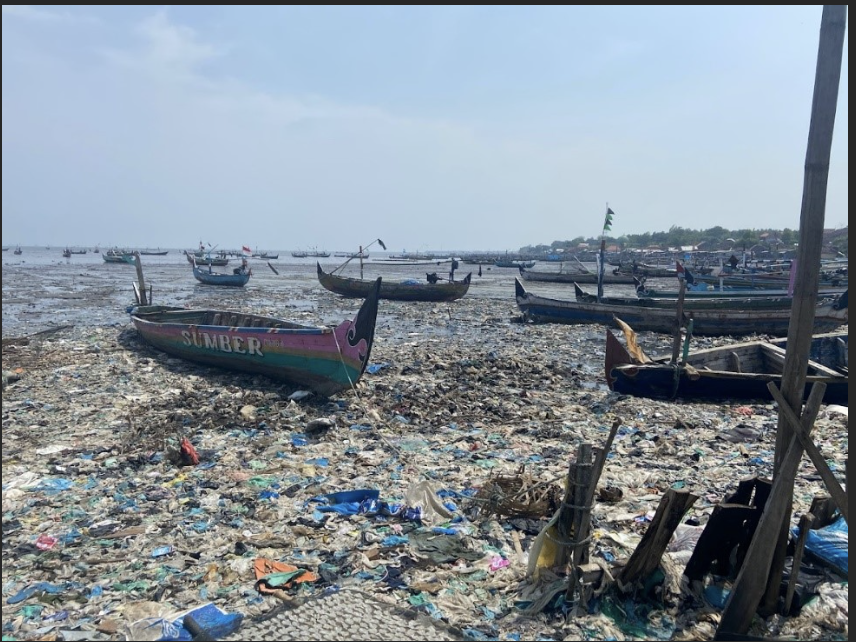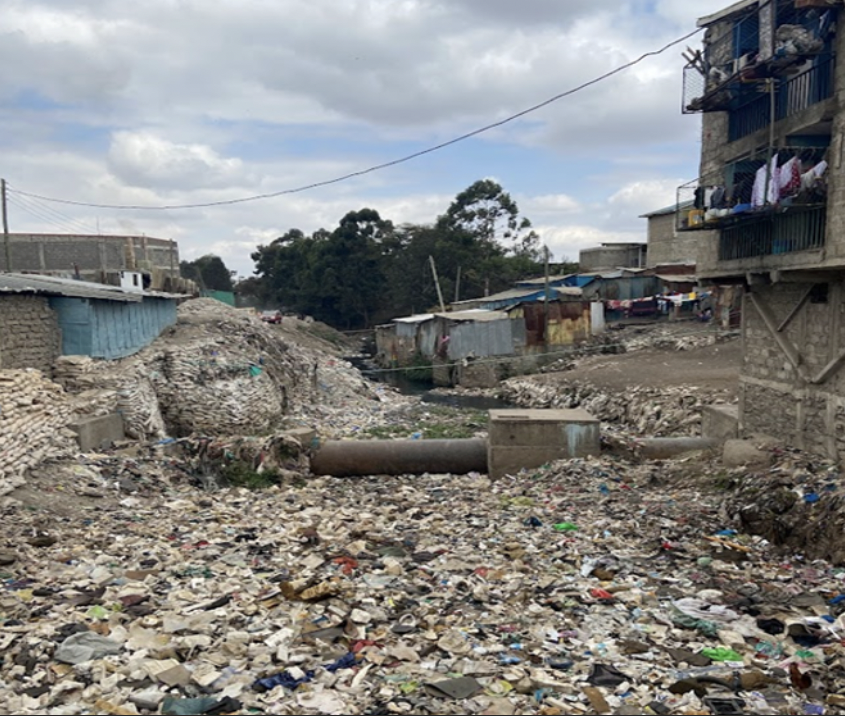Alina Marm
26 January 2023
Your waste travels. Quite a lot, actually. It travels down rivers. It travels through oceans - as waste exports in ship containers, through the currents as small pieces of plastic litter. It travels away from affluent to poor neighbourhoods.
And many of us are quite happy to see waste travel – out of our sight. In the past few weeks, I have travelled with waste and for waste. I saw what we usually try not to see. The past weeks I have spent time in Nairobi, Kenya and Indonesia to understand waste – especially the informal plastic recycling ecosystem. The travels are part of my PhD research which is trying to understand how we can create pathways to prosperity for the most marginalized in the ecosystem of informal plastic recycling.
What I sought to see is the waste we usually try to make unseen. But even more so, I sought to see the people that make waste unseen. Those that help us forget about waste while often being overlooked by society: the informal waste workers.
Both waste and I are quite efficient travellers. But some things seem not to travel well: German Lebkuchen (Gingerbread) that you bring as host gifts, for example. Another thing which does not travel well is prosperity. In this case, prosperity, the waste recycling industry and the broader circular plastic economy. The entire value chain benefits from recycled plastic: the shipping companies zipping plastic waste across oceans; a recycling industry with attractive growth rates; the brands marketing their products containing recycled plastic (and other recycled materials); us consumers feeling a little less guilty if that unnecessary water bottle contains recycled PET or the 6th pair of work-out shorts contain recycled polyester.
But in fact, it is not the ‘entire value chain’ that strives. The prosperity of plastic recycling does not reach the informal plastic recycling workers. They are cut-off from recycling as a source of prosperity even though they are the ones making much of our plastic prosperity possible. They are essential participants of the circular economy, but not beneficiaries.
What does it mean to be cut-off?
I had the honour to meet the heroes of waste management, I have had a glimpse at what living in a plastic waste crisis means practically, I heard the voicelessness, and I have marvelled at the motivation and resilience. I want to share some of my waste travel encounters, that illustrate what it means to be cut-off.
There are the women and men sorting waste at a recycling yard in Nairobi’s industrial district. Working eight hours a day, sorting and crashing HDPE plastic. Feet showing the load they need to carry without a good boot. Hands that have moved tons of plastic and have experienced the sharpness of it. Faces that show how hard it is to live in Nairobi on 10 USD a week. One lady summarized it point blank: “Here is no prosperity”. 10 USD a week in Nairobi covers roughly 20% of what you actually need in income to ensure basic housing in an informal settlement, not being hungry, pay for school fees, buy water and get access to a toilet.
There are the children which are babysat by the plastic waste while their mothers try to meet the sortation quota of the day. Street boys in the slums of Nairobi, who burn the plastic waste as the cheapest way to stay warm and collect the plastic waste as a means to feed themselves.
There is the community of landfill waste pickers that know economic hardship, harassment by officials, and aspire a healthy environment, but find comfort in the community. Where we laughed together, while being surrounded by waste. There is trust, mentoring, and support which does not make all good, but the worst better. On this landfill working in waste started as a necessity – a job to survive. And it developed into something that is valued. So much, that more than half would not take another job if the opportunity arose. Prosperity is found in more than just money.
But how can we turn a blind eye on the gaps in prosperity?
There is the one statement that travels with you from Nairobi to Indonesia: “The Chinese do PET. We do not do PET”. The brave will talk about the Chinese PET cartels and mafia. How can we change the system for the better if there is a PET superpower? How can we give equal access to the holy grail of plastic waste – the PET bottle?

There are the fishers in Indonesia who are so used to wading through plastic waste and their fish stock depleting. The parents who are so used to their children having ongoing coughs from burning waste at home. They are so used to the consequences of living with plastic waste they do not make the direct link to (plastic) waste anymore.

There are the residents of Slum B in Nairobi that live in waste because there is no other place to put it as the is no collection. There is a community that is painfully aware of the effects of the waste – and of possible solutions. How do we get these residents empowered?
There are the export countries mentioned in many conversations: Austria, UK, Ethiopia, Uganda. To only name those countries, the plastic sorters at the very beginning of the value chain know about. Rest assured, if you have used a product with recycled plastic, you will have used informally sourced plastic.
There is the growing number of private-public partnerships and local governments that invest in waste management in Indonesia. But at time with little connection to the informal workers. Is following the idea of co-existence the easiest way to scale waste management? Or is a stakeholder group of work power houses and knowledge holders left out of the loop?
There are the winners of all this: the “big bosses” among the recyclers (formal and informal), the brands that market their recycled content made possible by the ones collecting for non-living incomes, the government officials that have waste management businesses on the side, the country that becomes the PET superpower. The winners that prosper from waste but depend on the millions that can only say “Here is no prosperity”.
There is me winning from this. Winning a passion. A passion that is a privilege to pursue. The privilege being another manifestation of the injustice in waste management and beyond. After a day in waste, I go to a hotel, take a long shower, have a nice meal and theorize about what I have experienced during the day in a safe and comfy place. Whereas the ones I work with cannot just wash off the day and get comfy. Because after a day collecting and sorting plastic the next challenge is just around the corner: feeding your children, your health that is buckling, electricity you could not pay for yet. My privilege travels with me and is seen.
Privilege travels and cannot be overlooked. Waste travels and becomes unseen to most of us. Prosperity does not travel – and this needs to be seen. I hope that the next time you buy recycled products (and please do!), take a moment to see the unseen. And dear brand and recycling executives: look at your value chain, see the overlooked.
Alina Marm is a PhD researcher at the Institute for Global Prosperity, University College London. In addition to her research she has a career in corporate sustainability and circular economy. Her research is driven by the conviction that we must design a socially just circular economy and the belief that the (Plastic) waste crisis can actually be solved. She lives with her husband and son in Munich, Germany.
Fatemeh Sadeghi
30 May 2024 Feminists in the Global South have stepped out of the conventional territories of ‘women’s matters’ into more fund...